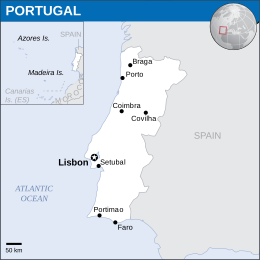More languages
More actions
(Estado Novo) Tag: Visual edit |
General-KJ (talk | contribs) (Added Minor Information.) Tag: Visual edit |
||
| Line 1: | Line 1: | ||
{{Infobox country|name=Portuguese Republic|native_name=República Portuguesa|image_flag=Flag of Portugal.svg|image_coat=Portugal COA.svg|capital=Lisbon|largest_city=Lisbon|mode_of_production=[[Capitalism]]|image_map=Portugal map.svg|map_width=260|official_languages=Portuguese|recognized_regional_languages=Mirandese|area_km2=92,212|population_estimate=10,352,042|population_estimate_year=2021}} | {{Infobox country|name=Portuguese Republic|native_name=República Portuguesa|image_flag=Flag of Portugal.svg|image_coat=Portugal COA.svg|capital=Lisbon|largest_city=Lisbon|mode_of_production=[[Capitalism]]|image_map=Portugal map.svg|map_width=260|official_languages=Portuguese|recognized_regional_languages=Mirandese|area_km2=92,212|population_estimate=10,352,042|population_estimate_year=2021}} | ||
'''Portugal''', officially the '''Portuguese Republic''', is a country in Western Europe. | '''Portugal''', officially the '''Portuguese Republic''', is a country in Western Europe bordered by [[Kingdom of Spain|Spain]]. It is a member of the [[European Union|EU]], and [[North Atlantic Treaty Organization|NATO]]. | ||
== History == | == History == | ||
Revision as of 17:09, 2 January 2024
| Portuguese Republic República Portuguesa | |
|---|---|
 | |
| Capital and largest city | Lisbon |
| Official languages | Portuguese |
| Recognized regional languages | Mirandese |
| Dominant mode of production | Capitalism |
| Area | |
• Total | 92,212 km² |
| Population | |
• 2021 estimate | 10,352,042 |
Portugal, officially the Portuguese Republic, is a country in Western Europe bordered by Spain. It is a member of the EU, and NATO.
History
After the War of Spanish Succession, which ended in 1714, Portugal became a British protectorate. The British protected Portugal's colonies against Spain and France in exchange for privileges such as access to ports and telegraphs and the ability to export capital. Semi-colonial control of Portugal continued up to the First World War.[1]
Estado Novo
The USA supported Portuguese colonialism in exchange for military bases in the Azores. Portugal was a founding member of NATO.[2]
Carnation Revolution
A military coup in 1974 overthrew the USA-backed fascist Estado Novo regime that had ruled the country since the 1920s. The provisional government then began to nationalize major industries, establish a minimum wage, and begin a land reform program. The USA subverted Portuguese trade unions and sabotaged the economy by cutting off trade. NATO sent 19 warships to Lisbon to intimidate the country and allow CIA-funded politicians to take power.[3]
References
- ↑ Vladimir Lenin (1916). Imperialism, the Highest Stage of Capitalism: 'Division of the World among the Great Powers'. Moscow: Progress Publishers. [MIA]
- ↑ David Vine (2020). The United States of War: 'Normalizing Occupation' (p. 304). Oakland: University of California Press. ISBN 9780520972070 [LG]
- ↑ William Blum (2002). Rogue State: A Guide to the World's Only Superpower: 'A Concise History of United States Global Interventions, 1945 to the Present' (p. 124). [PDF] Zed Books Ltd. ISBN 9781842772201 [LG]


